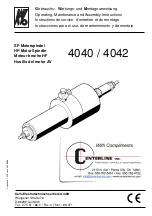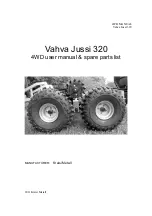
6
3. Intended use of the machine
The TUME JC seed drill can be used to plant most common grain, oil and herbaceous plant seeds, as well
as peas and beans. Granular fertilizer can also be planted using a fertilizer drill. Seed dressing and grass
seed drills may be acquired as optional equipment. Such equipment enables dressing during drilling and
grass seed planting to protect the seeds. In addition, the machine can be used separately for fertilizing or
drilling only.
Seeds and fertilizers needed for work can be transported to nearby fields in machine containers if the roads
used for transport are in good condition. The maximum permissible driving speed in this case is
15 km/h
.
On uneven roads and long drives, transport must be carried out with the machine in empty condition. The
machine may not be used to transport anything else but seeds and fertilizers required for immediate use,
and no additional load, objects, animals or passengers are allowed in the containers or on top of the machine.
General machine capabilities
The fertilizer feeding equipment is designed for the feeding of granular fertilizers only. The use of powder-
type fertilizers will usually cause difficulties. At worst, powder fertilizers may cause the feeding equipment to
jam, and for this reason, only granular fertilizers must be used.
Fertilizer application depth can be adjusted between 8 cm and the surface.
Drills can be fitted with different planting coulters depending on the prevailing conditions, see Fig. 36. Under
difficult, blocking conditions, the machine operates at its best when equipped with disc coulters. Other
alternatives include drag and wing coulters. Drag coulters are usually used in rigid ground types, when the
basic tillage is plowing. Wing coulters are best used for basic tillage, particularly for lighter ground types.
The coulter weighting adjustment range covers the needs for all ground types. The coulter’s suspension is
designed in such a way that ground unevenness will not significantly impact coulter weighting. For shallow
drilling, especially on light grounds, the coulter suspension must be adjusted to a low level. For rigid ground
types and deeper planting applications, higher weightings must be used.
Standard fertilizer coulters, see Fig. 34, are narrow and operate in a vertical position. These can be used
under most conditions. Fertilizer coulters have a high degree of flexibility, and therefore do not block easily.
JC Laser models are supplied with standard plate coulters on the seed side and single-disc fertilizer coulters
on the fertilizer side, see Fig. 35. Laser models are suitable for all kinds of sowing and especially to conditions
where sowing is replaced by light tillage.
For conditions where wear is a particular concern, the tips of drag coulters can be fitted with replaceable
ceramic pieces, and fertilizer coulter tips can be reinforced with wolfram carbide. This equipment can
increase durability up to ten-fold compared to ordinary means.
The support wheels fitted to the rear of the JC also operate as roller wheels. Two rows of seeds and one row
of fertilizer are applied by each wheel. Their rolling effect is adequate under normal conditions. The harrow
fitted to the rear of the wheels spreads the earthwork left between the wheels, breaks up the run in the
middle, and finalizes sowing. No easily smudged tracks are left on the field.
With the optional grass seed drill, the machine can simultaneously sow fertilizer, protective plant or grass
seeds, or equivalent. In its so-called HST version, the same device can also be used to apply certain trace
fertilizers and start phosphorus.
When equipped with a fertilizer remote control device, the machine is particularly suited for blocks with
varying ground types. The driver can adjust the fertilizer feed from the cabin during the drive, optimally
matching each ground type. Fertilizer remote control is fitted as standard with the TC+ on-board computer
(optional).
Other accessories are described in Section 24.







































